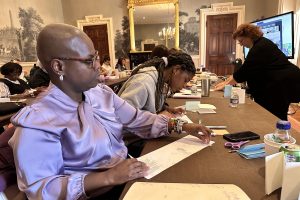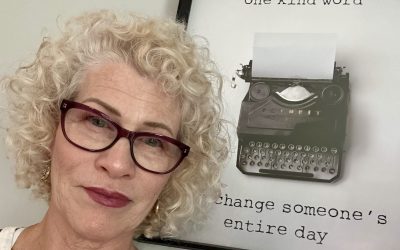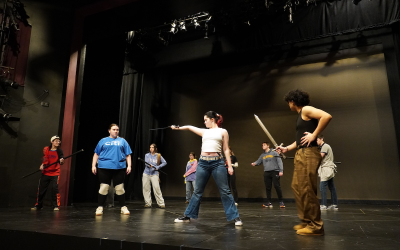Organized by the Medical & Health Humanities and Arts & Letters programs
April 2025 – Drew University’s Caspersen School of Graduate Studies held a Transforming Health Through the Arts Colloquium, organized and hosted by Drew’s Medical & Health Humanities and Arts & Letters programs.
The field of arts in health, which has been in practice for decades, is experiencing remarkable growth with a surge in initiatives across the country that highlight the positive impact of creative practices on mental, spiritual, and physical health and well-being. Recently, the New Jersey State Council announced the launch of a virtual series of Arts in Health Roundtables, in which Drew is a registered participant. Numerous examples demonstrate the integration of arts into public health, ethics, and medicine—with arts-based interventions successfully addressing health injustices.
The event welcomed experts in the field of art in health Patricia Pinciotti, professor emeritus at East Stroudsburg University and Liana Piehler G’01, affiliate professor at Drew. Medical & Health Humanities graduate students served as plenary speakers.
“The field and art in health is particularly interested in the transformative power of the arts for well-being and health,“ said Merel Visse, director of the Medical & Health Humanities program and moderator of the event. Her work was recently featured in a special issue she edited Art for the Sake of Care. “The crossover between health and the arts as spaces for ‘making and healing’ strengthen the community fabric,” she said. “The arts are not just ‘nice,’ but necessary for social cohesion and community belonging. We increasingly witness artistic practices as powerful vehicles for transformation. On a smaller scale, we have learned that the arts help individuals find meaning in challenging life events such as illness and disease, and the arts develop better responses against future challenges, ultimately contributing to a more robust and supportive environment for all.”
The event builds from the expertise shared during the 2022 Medical & Health Symposium, which highlighted the groundbreaking art in healing work by art educators Ellen Dissanayke and Liora Bresler and conductor and director of the American Foundation for Music and Healing Peter Shannon.
Doctoral student Jamila Hughley, who also completed the Contemplative Professional certificate, shared a vulnerable presentation, Out of the Sincerity of My Heart, based on how her experiences at Drew transformed her personally, professionally, and academically. “When I found Drew’s Medical & Health Humanities program, I felt it was made just for me,” she said. “My heart and my mind were not connected. Now, I feel like a different person.”
Rosemarie Gelber, also a doctoral student, presented her dissertation research on the well-being of primary care physicians by looking deeply into the practical wisdom (or: phronesis) they developed throughout their years of serving their patients. Her findings were transformed into Visual Challenge Cards. She interviewed and documented retired physicians plagued with repeated burnout, translating their experiences into a visual thinking tool to be used by incoming physicians.
Doctoral student Denise Couch-Gawley presented A Path to Peace, based on research outside of her dissertation. The project, inspired by her own childhood trauma, presented art as an outlet and path to self-forgiveness—to focus on the good, recognize the patterns, break the cycle, stay connected, and be creative.
Doctoral student Kyle Mednick presented A Poetic Wellness Practice and invited participants to write their own poems. The Body Endures, the Body Keeps Score, the Body Speaks, and the Body Heals – a Qualitative Inquiry of the Root of Black Birthing Bodies was shared by doctoral candidate Rose Jean-Baptiste. Certificate student Kimberly Ann Borin shared her inspiring work on Neuroaesthetics, Narrative, and Wonder, The Healing Power of the Contemplative Arts presentation.
Piehler, who values and actively practices the intersections of visual and written expression in her scholarly, pedagogical, and creative work, presented Art as a Means to Community and Personal Healing. These connections influence her teaching within Drew’s Medical & Health Humanities and Arts & Letters programs. Piehler will lead The Art of Healing graduate course in the fall of 2025.
Drew offers related courses taught by Affiliate Professor Gaetana Kopchinsky (Healing of the Self) and Adjunct Professor Erin Sheehan (Mindfulness), and by Assistant Professor of Digital Media Ryan Woodring (Soft Data: Art & Illegibility), who also serves as a dissertation advisor in the Medical & Health Humanities program.
Pinciotti offered an interactive bookmaking workshop, incorporating her research as an artist, teacher, author, and partner in C.R.E.A.T.E. labs—which stands for connect, realize, engage, attend, transform, expand. Through the highly engaging, arts-integrated experiences, Pinciotti promotes a creative growth mindset. Pinciotti’s C.R.E.A.T.E labs build on scholarship in art education, demonstrating the impact of practices of making on conceptual thinking and general well-being.
Throughout the day, speakers highlighted what it is like to revitalize communities and individuals, which refers to the program’s purpose of “humanizating” professional settings, aiming to rediscover human values and meaning in work. By implementing arts in health approaches, organizations can equip their staff to better understand and connect with the human experience, thus mitigating compassion fatigue and burnout. This approach prioritizes the well-being of all, fostering a more empathetic and sustainable work environment.




